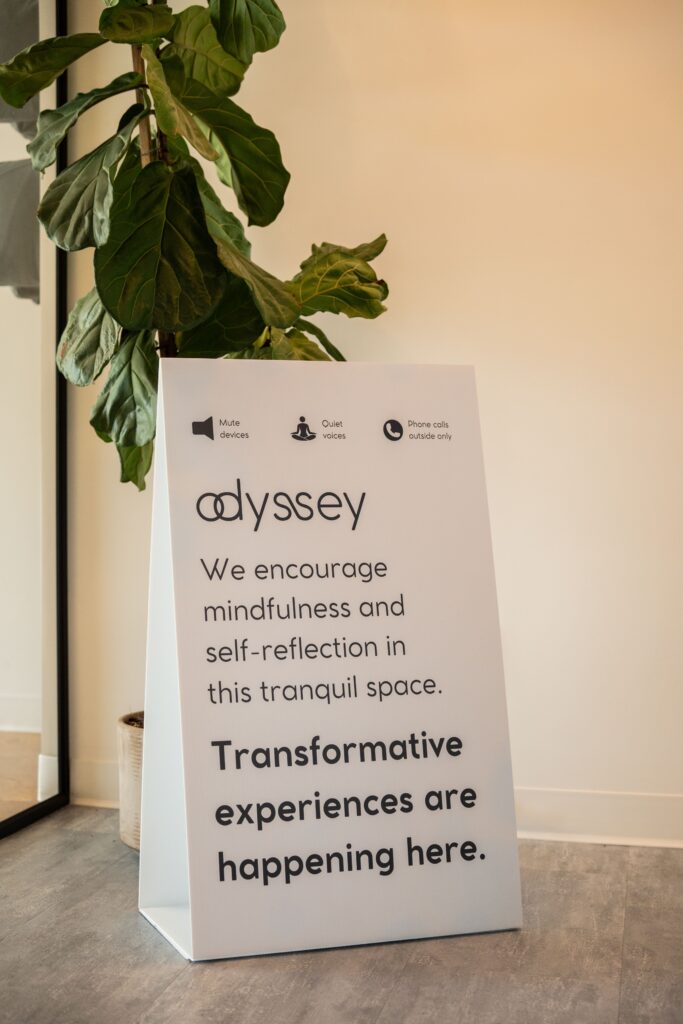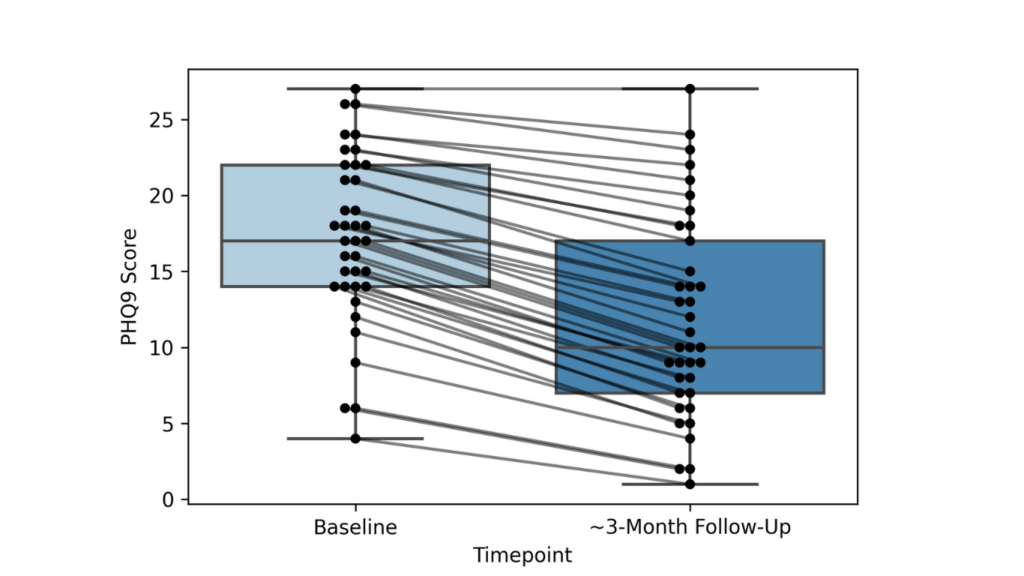Case Study: How Odyssey Alleviated Depression Symptoms for a 37 Patient Cohort
EntheoMed’s Odyssey lowered depression scores for 37 treatment-resistant patients through its innovative method of ketamine-assisted therapy.
EntheoMed’s Odyssey lowered depression scores for 37 treatment-resistant patients through its innovative method of ketamine-assisted therapy.


Odyssey is a mental health treatment, offering fast-acting relief for common conditions through a holistic method of ketamine-assisted therapy.
With a focus on personal care, Odyssey supports lasting wellness through a blend of transformative medicine, supportive counselling and mind+body integration practices.
Study Location: EntheoMed Kelowna
Case Study Cohort Size: 37
Time: 2022-2023
50% of Odyssey participants no longer have moderate to severe depression at 3 months. And 43% are no longer depressed at the 3 month follow up – as measured from our cohort data of PHQ-9 depression score results.

30%
average reduction in depression after one treatment
70%
largest drop in depression after one treatment
How would it feel to step into a lighter state of being? Our minds are capable of changing. Odyssey is the catalyst to let go of unhelpful patterns, making space for healthier ones.
Odyssey’s integrative, whole person approach addresses the root cause and transcends symptom management, for lasting mental health improvements.
22%
average reduction in anxiety after one treatment
95%
largest reduction in anxiety after one treatment
Mental illness is a leading cause of disability in Canada (Institute for Health Metrics and Evaluation, 2015; Lim et al., 2008; Mental Health Commission of Canada, 2014). In any given year, 20% of Canadians experience a mental illness, and by the age of 40, 50% have had – or will have – a mental illness (Dobson et al., 2020). Accounting for a large proportion of mental illnesses are mood disorders.
Major depression is the most prevalent mood disorder affecting approximately 5.4% of the Canadian population (Dobson et al., 2020). Depression can cause severe challenges and is characterized by persistent sadness, feelings of hopelessness, loss of interest in pleasurable activities, and sleep disturbance.
Unfortunately, amid the COVID-19 pandemic, there has been a rise in major depressive disorder (MDD) amongst adults (Liu et al., 2021). Specifically, in the Fall of 2020, 15% of Canadian adults screened positive for MDD, with the number rising to 19% in the Spring of 2021 (Liu et al., 2021).Alarmingly, it is estimated that only half of Canadians who experience a major depressive episode receive “potentially adequate care” (Patten et al., 2016). Moreover, for those who do receive care, existing pharmacological treatments are relatively lacking – with 30-40% patients deemed as “treatment resistant” (Papp et al., 2022). New pharmacological approaches are sorely needed.


Ketamine is an exemplar fast-acting glutamatergic anti-depressant which has been shown through clinical trials and meta-analyses to be effective for MDD, including in patients previously designated as treatment-resistant (e.g., Marcantoni et al., 2020; Phillips et al., 2019).
However, ketamine’s antidepressant effects, when administered as a standalone pharmacological treatment, are typically relatively short-lasting – most patients relapse after approximately 2 weeks (Marcantoni et al., 2020).
Emerging evidence suggests two avenues to extend the therapeutic effects of ketamine: (1) providing multiple infusions within a given period of time (e.g., 6 infusions in six weeks; Kryst et al., 2020), (2) or administering ketamine alongside psychotherapeutic support and adjunctive interventions (Drozdz et al., 2022; Price et al., 2022).
Our proprietary Odyssey Method is a unique approach to ketamine-assisted psychotherapy that draws from the latest perspectives in somatic, trauma-focused, transpersonal, and psychedelic-assisted therapies.
This approach is aimed at leveraging synergies between the psychological and neurobiological effects of ketamine, psychotherapy, and targeted adjunctive interventions to facilitate lasting change.

Selection Criteria
The cohort consists of patients suffering from clinically diagnosed depression that were referred to our clinic by their physician/psychiatrist.
Sample Size
37 Patients
Assessment Tools
Depression severity was assessed using the PHQ-9 standardized measure.
Duration
Patients were enrolled in the clinic on a rolling basis and assessed at baseline and at multiple follow-up time-points (1-week, 1-month, 3-months).
Odyssey Method Details
The cohort consists of patients suffering from clinically diagnosed depression that were referred to our clinic by their physician/psychiatrist.
Medicine
Therapeutic dose of intramuscular ketamine
Counselling
50 minute counselling pre-session and 50 minute counselling post-session.
Mind + Body Integration
Patients were enrolled in Odyssey Online – an educational learning portal filled with guidance on mind + body integration practices.


Chart shows a significant drop in PHQ9 scores at approximately 3-months post treatment.
There was a statistically significant reduction in PHQ-9 scores between baseline and the 3-month follow-up.
The number of patients that qualified for severe or moderately severe depression decreased by >50% at the 3-month follow-up.
In addition, 4 times as many patients no longer qualified for depression, with a PHQ-9 score less than 10.